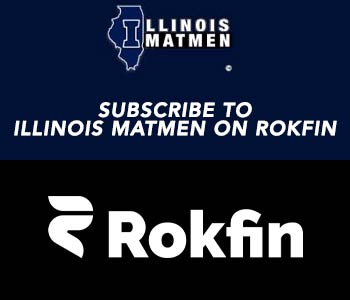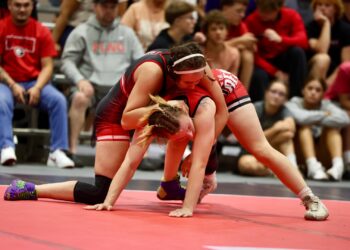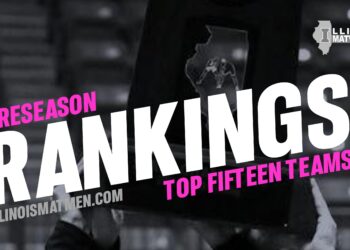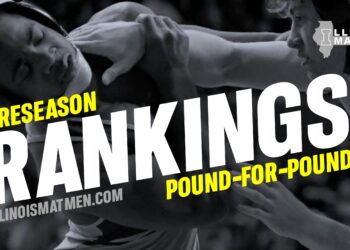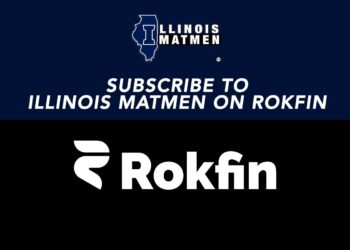TC LIFONTI
tclifonti.com
There is probably no coach with as much of a connection to a school than now former head wrestling coach Mark Hahn and Glenbard North High School. It was, after all, his father’s land that the school was built on—a land he worked on growing up as the son of a dairy farmer, and a land he worked on well after as arguably one of the greatest coaches in the history of Illinois athletics.
When Glenbard North opened up in the fall of 1967, it was Bob Fulk who came in as the program’s first coach. Aside from establishing Glenbard North as a state powerhouse almost immediately, he made it very clear over his twenty-year hall of fame career, that Glenbard North would always be relevant and part of the conversation about which programs are the best in the state of Illinois. For Hahn, when he took over the program at the end of the 1987 season, he had one focus. “As soon as I accepted the position,” Hahn said, “my first thought was not to [mess] this thing up. I wanted to continue what Bob had started and to make sure Glenbard North was always relevant.”
Growing Up Carol Stream
The original farmhouse that Hahn grew up in, as well as one of the family barns, still stands tall on the north-east corner of Lies and Kuhn Road. The land around the farm has changed greatly over the years, but the memories of what everything once was is still very clear to him.
“Before Glenbard North was built,” Hahn recalled, “that land was just a field we rotated crops on. One year we had hay on it, some years it was other crops like corn or beans. The cows were kept over by what is now Cloverdale school—that’s where we rented land and where our barn was.”
We had steers and chickens at the house, so we had to feed them, collect eggs, feed the cows, water, and all that. I started working full-time with my dad when I was in fifth grade—so I was about eleven or twelve. At that point I was getting up at five in the morning to help feed and milk the cows. Then I would go to school and, when I came home, there were more chores to do before we milked the cows one more time at night. On the weekends, they were just full days of working on the farm.”
In the middle of the chores and school, around that same time in 1965, Hahn’s father, Albert, would sell the land to District 87, and the construction of Glenbard North would begin.
“Once that school was built,” Hahn remembered, “that was the only school I wanted to go to. I was always going over there to watch football games and, when the school opened, Bob started the youth [wrestling] club.” As the son of a farmer, Hahn had his responsibilities at home, but sports became a positive outlet for his competitiveness. “I’m a competitive person,” Hahn said, “so I liked that aspect about sports. But sports kept me away from farming on the weekends—I wasn’t much of an athlete until high school, but I was the center for the basketball team at St. Isadore when I was younger. And because I was gone competing, and I wasn’t at the farm working, my dad wasn’t always too happy about my involvement in sports. I still had to do my chores in the morning, and I had to do my chores at night. Being raised like I was really helped with my work ethic as an athlete and, later on, as a coach.”
Mother Knows Best
On those Saturday mornings in the youth wrestling club is where Hahn would meet, be coached by, and form his relationship with Bob Fulk. And while Hahn’s father was farming, it was Hahn’s mother who ended up making wrestling a possibility.
“My mom worked at Glenbard from the day that it opened,” Hahn explained. “She started in the cafeteria, but she had been a secretary at the railroad before she got married to my dad. So, when the switchboard operator job opened up at Glenbard, she worked as a switchboard operator. Since she knew Bob, and Bob knew everyone that worked there, they talked and he got to know more about our family. He found out we were farmers—he was a farmer when he was a kid, so they talked about that—and once he learned that she had a son, he told her about the youth club and she got me involved.”
Upon entering the youth club, Hahn would walk into the Glenbard North wrestling room for the first time and hear about the program through the words and image of Bob Fulk. Hahn remembered that “The way Bob always presented the program was that it is was really something special—it was bigger than life. He would bring in wrestlers and talk about them and they would come in and help, so you always felt as if you were part of something special from the beginning.”
True to his form, Fulk had no problem making the boys work hard, and he had started a fairly strong following for his club. “It was a lot of hard work,” Hahn said, “but it was a lot of fun. It was just teaching kids who didn’t know anything about wrestling, wrestling. We wrestled for like six or eight weeks, then we participated in a Park District tournament. When I was in eighth grade, I competed once or twice outside of that. I don’t know if we had just started competing or what—I think I got my brains beat in—but I was just not understanding the moves and techniques right away. But I remember liking the sport and I enjoyed the work that went along with it.”




